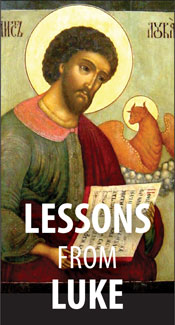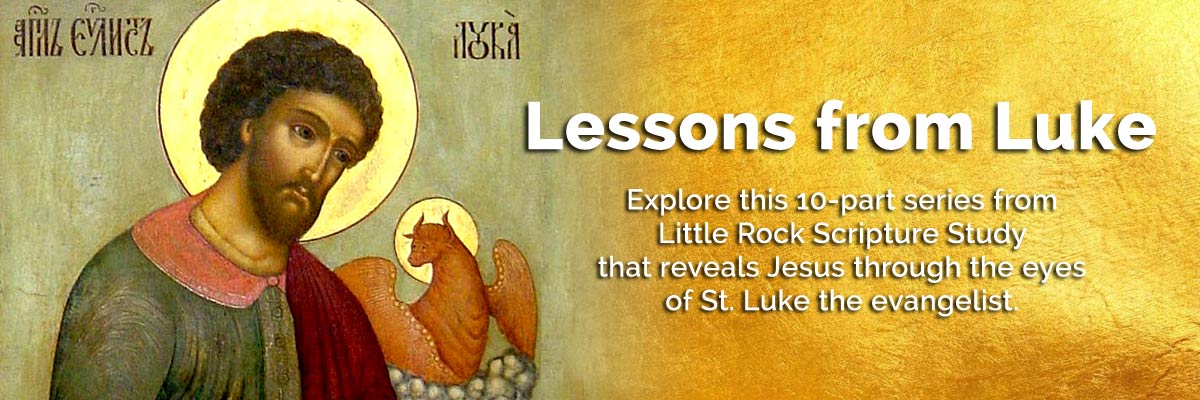Official Website of the
Catholic Diocese of Little Rock
The Gospel proclaims Jesus to the Church
Published: February 9, 2019
This is the first column in a 10-part series.
By Cackie Upchurch
Director of Little Rock Scripture Study
“The Gospel of the Lord.”
“Praise to you, Lord Jesus Christ.”
In our faith tradition, the proclamation of the Gospel enjoys what we might call “pride of place” in the Liturgy of the Word. During the first half of Mass, we give our attention to the readings from Scripture and to how those readings are opened up for us in the homily. Our gestures (crossing ourselves over our foreheads, lips and heart) and posture (standing) draw attention in a special way to the Gospel proclamation. The words we hear proclaim Jesus to us.
 The writers of the Gospels are not primarily journalists or biographers. While they call upon historical events and memories, they are not concerned with documenting their sources or providing a uniform sequence of events. Rather, they are evangelists who write with the purpose of introducing the reader to the very person of Jesus, hoping that their words will invite a faith response from the reader.
The writers of the Gospels are not primarily journalists or biographers. While they call upon historical events and memories, they are not concerned with documenting their sources or providing a uniform sequence of events. Rather, they are evangelists who write with the purpose of introducing the reader to the very person of Jesus, hoping that their words will invite a faith response from the reader.
Just as these writers are not professionally employed historians, Gospels are not intended to be an on-the-spot reporting. Gospels are the product of the writers witnessing what Jesus did and who Jesus was, prayerfully reflecting on his impact in their lives over time, and desiring to effectively share this Good News. Gospels are a response to the work of the Holy Spirit in the early communities of faith and it is the needs of those communities that help to shape how the individual writer shapes the story of Jesus and passes on the Good News that he proclaimed.
Among the four Gospels, three of them share a very similar sequence of events or framework. Matthew, Mark, and Luke are known as the Synoptic Gospels. The term “synoptic” simply means similar (syn) view or lens (optic). All three of these accounts begin with the appearance of Jesus in the ancient Middle East, two of them from the time of his birth and one of them from the time of his encounter with John the Baptist. The Gospel of John, however, begins with his eternal nature as the Word of God made flesh and organizes the materials of his public life quite differently than the synoptic writers.
Although the Synoptic Gospels of Matthew, Mark, and Luke share a story line and much of the same materials, each one also offers us something unique about Jesus and what it means to follow him. Each Gospel writer speaks from within a community of faith in different regions of the Ancient Middle East and employs the events and teachings of Jesus to address the needs of that community.
What emerges from reading all of the Gospels is a more textured or three-dimensional portrait of Jesus. What emerges from a careful reading of each one on its own is mindfulness of its particular flavor and spirituality. The church helps us to appreciate these subtle differences by organizing the Sunday readings in a three year cycle, each one focusing predominately on readings from one of the Synoptic Gospels.
Each new liturgical year begins in Advent and ends a year later with the Feast of Christ the King. Matthew is heard during what is referred to as Year A, Mark during Year B, and Luke during Year C. (The Gospel of John appears in the Easter season of all three years.) We are currently in Year C of the liturgical cycle so Luke is our guide. The lessons Luke offers in his portrait of Jesus and his followers are the subject of this series.
As we make our way through the year, pay close attention to the Gospel passages each Sunday and listen for the unique voice of the evangelist we know as Luke. His love for Jesus and the ways he interacted with all types of people, his care for proclaiming Jesus as savior of the world, and his attention to the compassion of Jesus will resound in our ears.
And follow along with these monthly articles as we explore some of the unique features of the Gospel According to Luke. We certainly live in a different time and place than Luke’s original audience but the human condition has not changed all that much. And the Jesus Luke reveals to us is still ready to teach and to heal.
Study Questions
- How do you prepare yourself to hear the Gospel proclaimed each Sunday? Do you read the passage in advance? Do you invite the Spirit to open your mind and heart to hear it freshly? Do you engage in some other practice that allows you to listen closely?
- What are some ways that a Gospel differs from a typical biography of a famous person?
- When did you first become aware that the Church has a liturgical cycle and that every three years that cycle repeats itself? What value do you find in this practice?
- Have you ever been particularly aware that a gospel passage is speaking to you in a particular way?
This article was originally published in Arkansas Catholic Feb. 9, 2019. Copyright Diocese of Little Rock. All rights reserved. This article may be copied or redistributed with acknowledgement and permission of the publisher.




